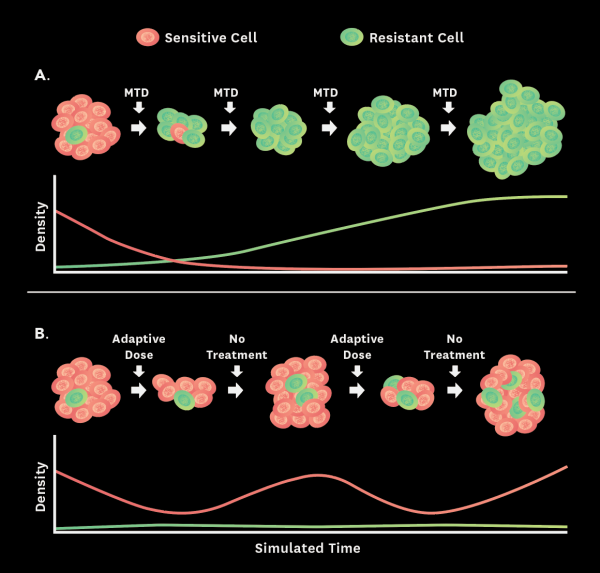Revamping Chemo Scheduling Using Mathematical Modeling

Traditional chemotherapy treatment methods for cancerous tumors often result in an initial shrinking period, followed by tumor regrowth (Figure, A). This can be due to the composition of the tumor, which may contain many different types of competing cancer cells.
Generally, when the appropriate chemotherapy drug is administered, it targets and kills the most prolific of the cells — referred to as the “sensitive” cells — and the tumor shrinks. However, without the sensitive cells, so-called resistant cells remain unaffected by the drug and continue to grow and divide, resulting in tumor regrowth.
A new treatment method under development by Paul Newton, USC Viterbi professor of aerospace and mechanical engineering, and Jeffrey West, M.S. ME ’14, Ph.D. ME ’18, uses an adaptive strategy aimed at controlling the two populations of cells. Their computational model applies evolutionary game theory, a mathematical framework that uses Charles Darwin’s concept of survival of the fittest. It also uses chemotherapy and cell data to predict the outcome of treatment.
Using a variable chemotherapy dose and timing schedule tailored to the tumor’s response, patients cycle between periods of treatment and no treatment, maintaining control over the cells and preventing tumor regrowth (Figure B).
According to the researchers, by keeping the sensitive and resistant cells in perpetual competition, neither population outgrows the other and the overall tumor volume can be kept below a size that would be dangerous to the patient. Rather than attempting to eliminate the cancer cells in hope of a cure, Newton’s and West’s work suggests that long-term cancer management may result in a better outcome and survival rate.



